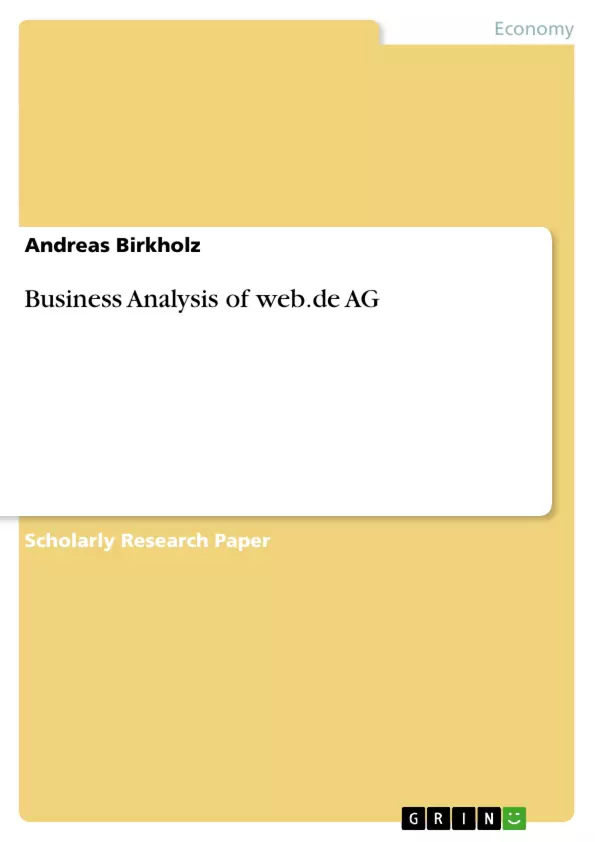The Internet has been emerging incredibly during the past decade. It has created new ways of communication and doing business. The companies operating via the Internet are confronted with speedy changes in their environment.
This term paper analyses the German Internet service provider web.de AG. First of all, the current industry and market of electronic commerce are subject to description. This is followed by a presentation of the current situation of web.de and its competitors.
The analytical chapter is split into two major parts: The qualitative analysis examines the environmental forces whereas the quantitative analysis puts emphasis on financial figures and ratios. Afterwards three options (short-term, mid-term and long-term) of future development of web.de are discussed. Finally, there is an outlook on the web service industry as a whole and some recommendations for web.de in particular. These recommendations are tested and modelled using a comprehensive spreadsheet which results in a three-year forecast.
Inhaltsverzeichnis (Table of Contents)
- The Industry and the Market
- Internet in Germany
- Freemail Market in Germany
- The Companies
- Similarities
- Target Company: Web.de AG
- Selected Competitors
- Freenet.de AG
- United Internet AG
- Other Competitors
- Qualitative Analysis
- Macro-Environment Scope: PEST Analysis
- Political and Legal Factors
- Economic Factors
- Social Factors
- Technological Factors
- web.de scope: Ansoff matrix
- Critical Review of Applied Models
- Quantitative Analysis
- Horizontal Analysis
- Vertical Analysis
- Key Financial Ratios
- Cross-sectional Analysis
- Definition of the Benchmark
- Comparison of Web.de with the Chosen Competitors
- Critical Review of Applied Models
- Strategic Options (Scenarios)
- Short-term Option: Acquire New Paying Customers
- Mid-term Option: Focus on B2B
- Long-term Option: Expansion
- Evaluation of Web.de's Vision
- Outlook and Recommendations
- Industry Outlook
- Recommendations and Forecast for Web.de
Zielsetzung und Themenschwerpunkte (Objectives and Key Themes)
This term paper aims to analyze the German Internet service provider web.de AG within the context of the evolving electronic commerce industry. It provides a comprehensive assessment of the company's current situation, its competitors, and potential strategic options for future development. The analysis incorporates both qualitative and quantitative perspectives to gain a holistic understanding of web.de's strengths, weaknesses, opportunities, and threats.
- Market analysis of the German internet service provider industry
- Comparative analysis of web.de and its competitors
- Qualitative and quantitative evaluation of web.de's business performance
- Identification of potential strategic options for web.de's future development
- Outlook on the industry and recommendations for web.de
Zusammenfassung der Kapitel (Chapter Summaries)
- Chapter 1: The Industry and the Market: This chapter provides an overview of the internet and freemail markets in Germany, highlighting key trends and challenges. It contextualizes the competitive landscape in which web.de operates.
- Chapter 2: The Companies: This chapter introduces web.de AG and its selected competitors. It explores similarities and differences in their business models, target markets, and overall positioning.
- Chapter 3: Qualitative Analysis: This chapter delves into a qualitative assessment of the external environment impacting web.de, employing a PEST analysis. It also explores the company's potential for market expansion using an Ansoff matrix.
- Chapter 4: Quantitative Analysis: This chapter focuses on a quantitative analysis of web.de's financial performance, utilizing various financial ratios and cross-sectional comparisons with competitors.
- Chapter 5: Strategic Options (Scenarios): This chapter outlines three strategic options for web.de's future development: a short-term option focused on acquiring new paying customers, a mid-term option emphasizing B2B services, and a long-term option aimed at market expansion. It also evaluates the company's current vision and its alignment with these options.
- Chapter 6: Outlook and Recommendations: This chapter presents an outlook on the future of the web service industry and provides specific recommendations for web.de's future development. These recommendations are based on the insights gathered throughout the analysis.
Schlüsselwörter (Keywords)
The primary keywords and focus topics of this analysis include: internet service provider, freemail market, competitive analysis, PEST analysis, Ansoff matrix, financial ratios, cross-sectional analysis, strategic options, B2B, B2C, market expansion, industry outlook, recommendations, and web.de AG.
Frequently Asked Questions
What is the focus of the business analysis for web.de AG?
The paper analyzes web.de AG's market position, financial performance, and future strategic options within the German e-commerce and freemail industry.
Who are the primary competitors of web.de discussed in the paper?
The analysis compares web.de specifically with Freenet.de AG and United Internet AG using cross-sectional benchmarking.
What models were used for the qualitative analysis?
The paper utilizes a PEST analysis for the macro-environment and an Ansoff matrix to evaluate market expansion strategies.
What strategic options are proposed for web.de's future?
Three scenarios are discussed: a short-term focus on acquiring paying customers, a mid-term focus on B2B services, and long-term expansion.
Does the paper include financial forecasts?
Yes, the recommendations are tested using a comprehensive spreadsheet resulting in a three-year financial forecast for web.de.
- Citation du texte
- Dipl.-Ing., MBA Andreas Birkholz (Auteur), 2004, Business Analysis of web.de AG, Munich, GRIN Verlag, https://www.grin.com/document/32532



